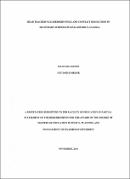| dc.description.abstract | The study sought to find the relationship between Head Teacher's Leadership Style and Conflict
Resolution in Secondary Schools in Jinja District in Uganda. Specifically, the study aimed at
establishing the relationship between each Leadership Style; autocratic leadership, laissez faire
leadership, democratic Leadership Styles and Conflict Resolution strategies since the study
problem was mainly tied on the Dual concern model. A descriptive survey design supported by the
qualitative and quantitative approaches was used. Data from 141 students, 8 teachers and 4 Head
Teachers from four Secondary Schools; Jinja College, Busoga College, MM College Wairaka and
Jinja senior Secondary Schools was collected using questionnaires and interviews. The schools and
Head Teachers were selected by purposive sampling, students were selected by stratified random
sampling while teachers were selected by snowball sampling technique. The quantitative data was
analyzed using quantitative techniques; simple statistics and Pearson moment product correlation.
Additionally, qualitative data was analysed according to magnitude and new emerging responses.
The researcher discovered that when Head Teachers exercise Democratic Leadership Style, they
employ problem solving strategies like negotiation, mediation, dialogue, voting on an issue among
others in resolving students' conflicts while accommodation is also inbuilt. The Head Teachers who
exercise Laissez faire Leadership Style frequently use avoidance mechanism in Conflict Resolution
such as delegation of authority and giving liberty to the subordinates and will also employ
accommodative strategies for the sake of keeping peace in school. Autocratic Leadership Style used
by Head Teachers normally centralizes authority in making decisions regarding Conflict Resolution
in school. Therefore, Conflict Resolution in Secondary Schools is related to Head Teacher's
Leadership Style. The researcher recommended that Head Teachers and teachers need to identify
strategies and practices that can be used to reduce the various forms of students related conflicts,
protecting students' rights, regular sensitization of students in all schools. | en_US |

